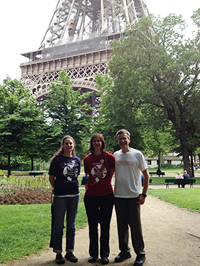Following is a first-person account from Julie Kennedy, senior publications editor in the Office of Public Affairs. Kennedy visited Paris during the 2012 program.
Studying abroad isn’t just for students anymore.
As part of a Washington University initiative aimed at increasing diversity awareness, staff were invited to apply in 2011 to the Global Diversity Overseas Seminar to experience new world views and issues through trips to either Shanghai or Paris.

When I applied in fall 2011, I saw this program as a dream come true. I did not study abroad in college, and now I was being offered a second chance. The description of the program sounded ideal: We would meet beforehand throughout the spring to learn about the issues we would be studying on our trip, and we would attend classes and lectures while in our destination city.
We would have the opportunity to bring back what we learned and share it with the university community. I leapt at the chance to not only see a great city, but study and learn about it on a deeper level than if I were just a tourist.
When the email arrived in January informing me I was selected, I was thrilled. Colleagues congratulated me, and my family was very excited.
As the spring passed, we dug into our readings and discussed them at our monthly meetings. We were asked to attend two cultural events in St. Louis and write blog entries about them. As we were taking all of this in, we were instructed to be thinking about a topic to observe and report on while abroad. My topic was the lack of diversity in the French media, and this targeted approach helped me see Paris as few tourists have.
In Paris, we joined Washington University students in the Pluralism, Politics and Religion summer program for several lectures, including one morning in The Louvre. We also talked with a diversity expert about disability issues in Paris and with representatives from a mental health clinic for immigrants. We mapped an evolving neighborhood to document how its demographics have changed since 1970, toured a mosque and visited an African neighborhood where we ate at a Senegalese restaurant.
As we rushed from event to event on the Metro, we observed daily Parisian life in many contexts: the cafe culture and affluent neighborhood surrounding our hotel; the tourism near all of the top Paris sites; and immigrants in a West African neighborhood and in Belleville, a neighborhood that is home to Jews, North African Muslims and Asians. We also had one day mostly to ourselves to delve into our topic.
In addition to our class explorations, we managed to see the sites of Paris, a stunningly beautiful and diverse city.
Upon our return, we held several presentations on what we learned and how our experiences have impacted our jobs.
I am grateful I had this opportunity, and I encourage anyone interested to apply to this year’s program in Santiago, Chile.